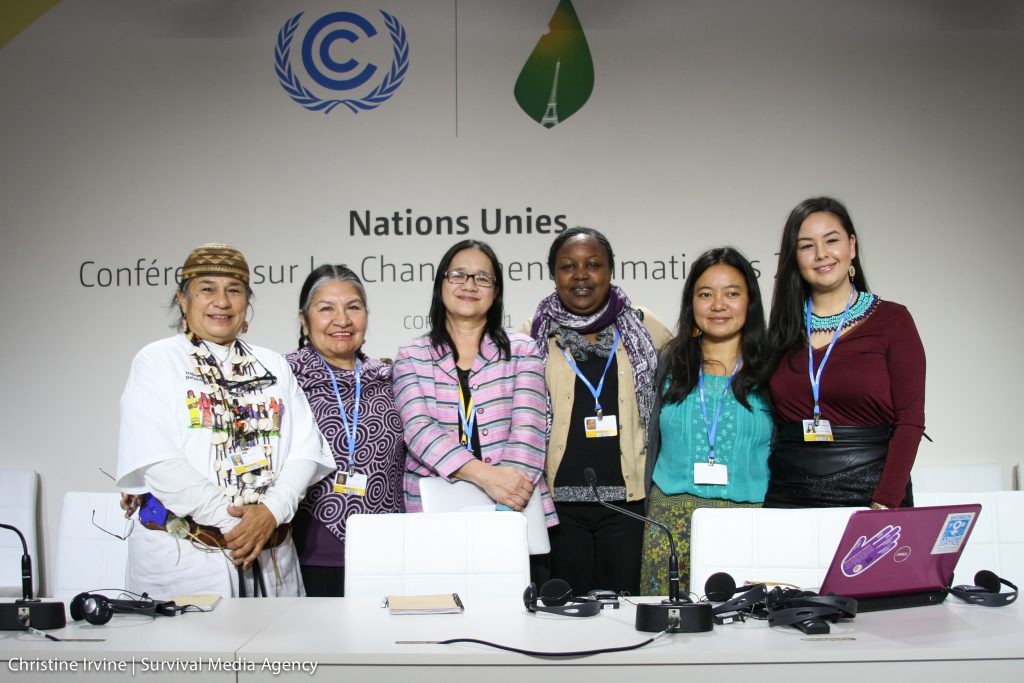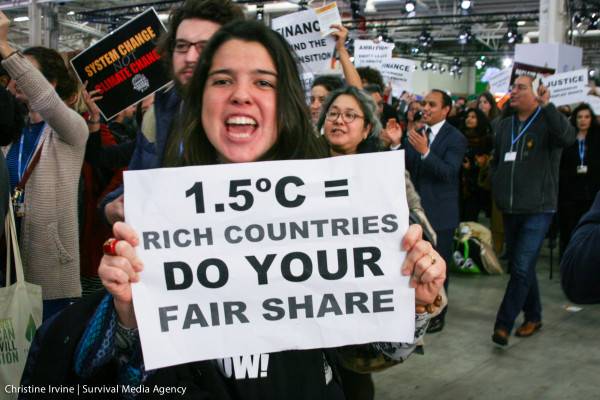FRIDA advisors Alina Saba and Ayesha Constable attended the 2015 United Nations Climate Change Conference (#COP21) that was held in Paris in December 2015. Here they pen their experience as young feminist activists at a critical global forum. To know more about FRIDA’s advisory committee, click here.
One of the first things we noticed and experienced at COP21 in Paris was that gender was a ‘hot button’ issue there. The discussions on gender ranged from its inclusion in Article 2 of the agreement to the inclusion of ‘gender responsiveness’ in the finance and technology components. The Women and Gender Constituency (WGC), one of the key stakeholder groups of the The United Nations Framework Convention on Climate Change (UNFCCC), provides opportunities for civil society and non-governmental organizations which work for women’s rights and gender justice, environmental protection, or both, to influence the annual conferences and contribute to the UNFCCC.
This year, the WGC was especially vocal and deliberate in its efforts to bring attention to the vulnerability of women and indigenous groups to climate change. Women articulated their demand for a gendered response to climate change and called for ‘system change’ as a means of addressing it. System change should challenge the current economic and political systems that perpetuate gender injustice. Kate Lappin, Regional Coordinator of the Asia Pacific Forum on Women, Law and Development (APWLD), asserted that the current global economic structure depends on the inequality between men and women. Some activists called for an overhaul of the structure of the UNFCCC, pointing at the skewed ratio of men to women in the leadership of the organisation as a major flaw in the system.

The call for system change was amplified by young and passionate feminists on Young Feminist Day. Young activists from around the world used the day to make calls for greater action and inclusion in climate change processes. Young women used the day to join the wider WGC in calling for “bold, ambitious, binding agreement that dismantles a globally unjust order and the framework that disadvantages women”. Women were visible and vigilant and were adamant in their defence of the needs of women and other vulnerable groups and by extension all of humanity. It was heartening to see young feminists demonstrating awareness and passion as they led actions and presented on panels.
Despite their presence and representation at COP21, young feminists shared their disappointment with the continued segregation based on their age and, thus, “inexperience”. Some young activists argued that ageism and cultural views on age sometimes leads to their exclusion or mere tokenistic involvement in some spaces and discussions. One activist lamented the lack of tools and resources developed by young women for young women. There was a call by young feminists for greater equity in the movement to allow young women the opportunity to be fully engaged and participate in a wholesome manner.
Even with the increasing number of young women who are being afforded opportunities to attend the COP, there is room for more young women of the Global South to attend. The challenges of young women globally, though similar in some ways, differ based on the economic, social and political context. The realities of young women in the global north and south are vastly different and are best represented by the people who themselves have to live these experiences. This assertion is in keeping with the call made by Tetet Lauron of Ibon International that the new agreement needs to be framed as ‘our own coming from our own, open to input from the [local] community’.
COP 21 failed to give a strong climate agreement that women rights activists had been advocating for. In the words of Tess Vistro, climate justice activist from Philippines: “The Paris Agreement failed those who most needed it: The women of the global south who have contributed nothing to the problem but suffering the greatest, most deadly impact COP 21 traded away the rights of the most vulnerable communities, specially of rural, indigenous, urban poor and migrant women in one the greatest opportunity to re-write the history of the planet earth.”. The inaction and failure of governments has made women rights activist to act in solidarity more strongly. Women rights activists have declared to reclaim power in their hands to change the climate change by creating local climate justice movements and influencing the policy at local, national and global level.
During the two weeks in Paris, we witnessed a strong civil society activism and action calling for strong climate agreement. Despite French government’s ban on civil society due to the state of emergency, thousands of climate justice activists came out in the street of Paris to join the human chain before the COP 21 began. Civil society activists kept the voice of climate justice high and that boosted our faith that people all over the world are still united for justice.

Women and Gender Constituency at the UNFCCC in Paris, France December 3, 2015
WGC joined the civil society group and activists like Naomi Klein to talk about the link between the trade agreement and climate change—a perspective that was missing at COP 21. Unless we talk about our global economic model that is driven by burning of fossil fuel and unequal distribution of wealth and resources, we cannot achieve climate justice because the current global system we live in is driven by the unequal economic system where women are the most vulnerable group.
The climate justice movement is bringing together people working from diverse background together to demand system change. It is creating solidarity between movements led by women, trade unions, farmers, indigenous peoples, educator, youths and many more. It is an opportunity for young feminists around the world to create a stronger movement and be intersectional in their feminist approach and politics.
As penned by Alina Saba and Ayesha Constable